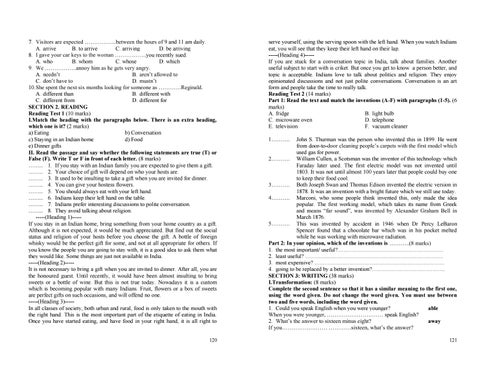7. A. arrive
B. to arrive
C. arriving
A. who
B. whom
C. whose
8.
9 and 11 am daily. D. be arriving ou recently sued. D. which
9. A. C.
B. D.
10. A. different than B. different with C. different from D. different for SECTION 2. READING Reading Test 1 (10 marks) I.Match the heading with the paragraphs below. There is an extra heading, which one is it? (2 marks) a) Eating b) Conversation c) Staying in an Indian home d) Food e) Dinner gifts II. Read the passage and say whether the following statements are true (T) or False (F). Write T or F in front of each letter. (8 marks) 1. If you stay with an Indian family you are expected to give them a gift. 2. Your choice of gift will depend on who your hosts are. 3. It used to be insulting to take a gift when you are invited for dinner. 4. You can give your hostess flowers. 5. You should always eat with your left hand. 6. Indians keep their left hand on the table. 7. Indians prefer interesting discussions to polite conversation. 8. They avoid talking about religion. -----(Heading 1)----If you stay in an Indian home, bring something from your home country as a gift. Although it is not expected, it would be much appreciated. But find out the social status and religion of your hosts before you choose the gift. A bottle of foreign whisky would be the perfect gift for some, and not at all appropriate for others. If you know the people you are going to stay with, it is a good idea to ask them what they would like. Some things are just not available in India. -----(Heading 2)----It is not necessary to bring a gift when you are invited to dinner. After all, you are the honoured guest. Until recently, it would have been almost insulting to bring sweets or a bottle of wine. But this is not true today. Nowadays it is a custom which is becoming popular with many Indians. Fruit, flowers or a box of sweets are perfect gifts on such occasions, and will offend no one. -----(Heading 3)----In all classes of society, both urban and rural, food is only taken to the mouth with the right hand. This is the most important part of the etiquette of eating in India. Once you have started eating, and have food in your right hand, it is all right to 120
serve yourself, using the serving spoon with the left hand. When you watch Indians eat, you will see that they keep their left hand on their lap. -----(Heading 4)----If you are stuck for a conversation topic in India, talk about families. Another useful subject to start with is criket. But once you get to know a person better, and topic is acceptable. Indians love to talk about politics and religion. They enjoy opinionated discussions and not just polite conversations. Conversation is an art form and people take the time to really talk. Reading Test 2 (14 marks) Part 1: Read the text and match the inventions (A-F) with paragraphs (1-5). (6 marks) A. fridge B. light bulb C. microware oven D. telephone E. television F. vacuum cleaner John S. Thurman was the person who invented this in 1899. He went from door-toused gas for power. William Cullen, a Scotsman was the inventor of this technology which Faraday later used. The first electric model was not invented until 1803. It was not until almost 100 years later that people could buy one to keep their food cool. Both Joseph Swan and Thomas Edison invented the electric version in 1878. It was an invention with a bright future which we still use today. Marconi, who some people think invented this, only made the idea popular. The first working model, which takes its name from Greek March 1876. This was invented by accident in 1946 when Dr Percy LeBaron Spencer found that a chocolate bar which was in his pocket melted while he was working with microwave radiation. Part 2: In your opinion, which of the inventions is 1. the most important/ useful?........................................................................... 2. least useful? .................................................................................................. 3. most expensive? ............................................................................................ 4. going to be replaced by a better invention?.................................................... SECTION 3: WRITING (38 marks) I.Transformation: (8 marks) Complete the second sentence so that it has a similar meaning to the first one, using the word given. Do not change the word given. You must use between two and five words, including the word given. 1. Could you speak English when you were younger? able speak English? 2. away 121
